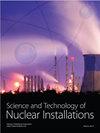Thermomechanical Analysis of a Reactor Pressure Vessel under Pressurized Thermal Shock Caused by Inadvertent Actuation of the Safety Injection System
IF 0.9
4区 工程技术
Q3 NUCLEAR SCIENCE & TECHNOLOGY
引用次数: 3
Abstract
The damage induced pressurized thermal shock (PTS) may pose to a reactor pressure vessel (RPV) is a critical safety requirement assessed as part of the ageing management programme of pressurized water reactors (PWRs). A number of researches have studied PTS initiated mainly by postulated accidents such as loss of coolant accidents (LOCAs). However, investigations on PTS-induced threat on RPV caused by inadvertent actuation of the safety injection, a frequent anticipated transient, have not been thoroughly studied. In this paper, a simplified multistep analysis method is applied to study the thermomechanical status of a two-loop PWR under PTS loads caused by inadvertent actuation of the safety injection system. A direct-coupling thermomechanical analysis is performed using a three-dimensional (3D) RPV finite element model. A 3D finite element submodel (consisting of the highiest stress concentration area in the RPV) and an assumed crack are then used to perform fracture mechanics analysis. Subsequently, the critical integrity parameter-stress intensity factor (SIF) is estimated based on FRANC3D-M-integral method coupled in the multistep simulation. The material fracture toughness of the vessel is computed based on the master curve method with experimental fracture toughness data. The results obtained from the direct coupling stress analysis in comparison with sequential coupling approach demonstrate the effectiveness of the proposed multistep method. Also, comparing SIF results obtained with that calculated based on the conventional virtual crack-closure technique (VCCT) and extended finite element method (XFEM) show good agreement. This study provides a useful basis for future studies on anticipated transient-induced crack propagation and remaining service life prediction of ageing reactor pressure vessels.反应堆压力容器在安全注射系统误动引起的加压热冲击下的热力学分析
压力热冲击对反应堆压力容器造成的损伤是压水堆老化管理方案中一个重要的安全要求。许多对PTS的研究主要是由假设的事故如冷却剂损失事故(LOCAs)发起的。然而,由于安全注入的意外驱动(一种常见的预期瞬态)而引起的pts对RPV的威胁尚未得到充分研究。本文采用一种简化的多步分析方法,研究了安全喷射系统误动引起的PTS载荷下双环压水堆的热力状态。采用三维(3D) RPV有限元模型进行了直接耦合热力学分析。然后使用三维有限元子模型(由RPV中最高应力集中区组成)和假设裂纹进行断裂力学分析。在此基础上,基于franc3d - m积分法在多步模拟中耦合估计了临界完整性参数-应力强度因子(SIF)。利用实验断裂韧性数据,采用主曲线法计算容器材料断裂韧性。将直接耦合应力分析结果与顺序耦合方法进行了比较,验证了多步骤方法的有效性。将所得的SIF结果与基于传统虚拟裂纹闭合技术(VCCT)和扩展有限元法(XFEM)的计算结果进行了比较,结果吻合较好。该研究为今后对老化反应堆压力容器瞬态裂纹扩展的预测和剩余使用寿命的预测提供了有益的基础。
本文章由计算机程序翻译,如有差异,请以英文原文为准。
求助全文
约1分钟内获得全文
求助全文
来源期刊

Science and Technology of Nuclear Installations
NUCLEAR SCIENCE & TECHNOLOGY-
CiteScore
2.30
自引率
9.10%
发文量
51
审稿时长
4-8 weeks
期刊介绍:
Science and Technology of Nuclear Installations is an international scientific journal that aims to make available knowledge on issues related to the nuclear industry and to promote development in the area of nuclear sciences and technologies. The endeavor associated with the establishment and the growth of the journal is expected to lend support to the renaissance of nuclear technology in the world and especially in those countries where nuclear programs have not yet been developed.
 求助内容:
求助内容: 应助结果提醒方式:
应助结果提醒方式:


